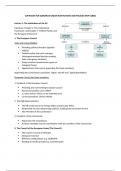SUMMARY FOR EUROPEAN UNION INSTITUTIONS AND POLICIES (PAP-21806)
Lecture 1: The institutions of the EU
Literature: Chapter 3 ‘The institutional
framework’ and Chapter 7 ‘Political Parties and
the European Parliament’
1. The European Council
Tasks and responsibilities:
Providing political direction (agenda-
setting)
Problem solver and crisis manager
(interngovernmental decision-making
body, emergency decisions)
Treaty revisions (unanimously agree on
changing Treaty)
Appointments (key role in appointing the three members)
Appointing the Commission’s president, ‘fights’ with EP over ‘Spitzenkandidaten’
European Council has three members:
1. President of the European Council
Presiding and representing European Council
Permanent position since 20009
2,5 year period, which can be extended once
Current president: Charles Michel
2. The High Representative
The HR of the Union for Foreign Affairs and Security Policy
Responsible for executing foreign policies, leading External Action Service
Also Member of the Commission
3. President of the Commission
Represents the Commission
At these meetings ensures coordination with the activities of the Commission
2. The Council of the European Union (The Council)
The Council; Council of Ministers
Intergovernmental
Different configurations (e.g. AGRIFISH)
Rotating 6-months presidency, currently Spain
,Main tasks:
Legislative tasks: legislator (discussed in public)
Executive tasks: external relations, incl. security and defense, enlargement (behind closed
doors)
3. The European Commission
Supernational
Headed by College of Commissioners, appointed by MSs
Tasks:
Monopoly on preparing and initiating legislation
Implementing policies
External representation (e.g. trade negotiations)
Guardian of the treaties (monitors correct application and correct implementation, may take
legal action)
4. The European Parliament
Supernational
Directly elected by EU citizens
Tasks:
Budgetary powers: right of approval
Legislative powers: co-decision or advise
Scrutiny of the executive: right of information (writes question to Commission, Council and
European Council), investigative commissions (investigation Diesel gate-scandal), submit
cases to Court of Justice
Appointment and dismissal of Commission
Three types of entities:
1. Domestic political parties: are organizations that are based in the MS and put forward
candidates for the EP elections (e.g. VVD, CDU, Lega)
2. Political groups: coalition between elected MEPs made up from different domestic political
parties
3. European political parties: associations of domestic political parties and operate outside the
EP
Domestic parties play a central role because they create and manage the other two.
5. The Court of Justice
Supranational, judicial power
Appointed by common accord of the governments of the MS
Are appointed for a renewable term of six years
Tasks:
, Reviewing the legality of acts: court assess if activities of EU’s institutions are carried out
using the appropriate procedures, possibly resulting in action for annulment (= case brought
before the CoJ in which interested parties believe any of the institutions has not acted
accordingly to EU law)
Establishing infringements procedures (= legal procedure set in motion by the European
Commission against a Member State if it does not comply with EU legislation, which may end
in ruling by the CJ)
Giving preliminary rulings (= binding interpretation on a matter of EU law delivered by the CJ
at the request of a MS court)
Organization, the CoJ consist of two courts:
1. The CJ (highest court): deals with preliminary rulings, infringements procedures and decides on
actions for annulment brought by MS against EP or the Council.
2. The General Court: deals with actions brought by natural or legal persons seeking annulment, or
cases brought by MS against the Commission.
6. European Central Bank (ECB)
Issue the EU’s currency
Act as lender of last resort
Implement monetary policies
Tasks:
Conducting the EU’s monetary policy: maintain price stability
Maintaining the financial stability of the Eurozone system: keeps track of financial health of
the Eurozone
Conducting foreign exchange operations and maintaining the Eurozone’s foreign reserves: to
ensure liquidity and stability of the Eurozone, ECB may buy or sell foreign reserves
7. The European Court of Auditors
Tasks:
Checks the revenue and spending of the EU and all its institutions
Examines efficiency and effectiveness of all EU policy areas
Coordinates the work of different auditing courts in EU MS
Separation of powers
Name Role Representing What form?
European Council Executive1 + 3 MS
Council Executive2 / MS Interngovernmental
Legislative
European Commission Executive1 + 2 + 3 Union
European Parliament Legislative Citizens
Court of Justice of the Judicial Union Supernational
European Union institutions
European Central Bank Executive 2 Union
Court of Auditors Control Union
Executive tasks = 1) giving political direction, 2) implementing policies, 3) externally representing EU
, Legislative tasks = examining, modifying and adopting legislative measures
Judicial tasks = interpretation of EU law, adjustification of conflicts involving EU institutions, MS and
all other parties
Control = providing additional supportive tasks (examines EU’s revenues and expenses)
The headquarters of the main institutions of the EU
Location Headquarters main institutions EU
European Commission
Council of the EU
Brussels
European Council
European Parliament
Strasbourg European Parliament
Frankfurt European Central Bank
Council of the EU
European Parliament
Luxembourg
European Court of Auditors
Court of Justice of the EU
European political party
Represent major political families; linked to (one or more) political groups in EP
Role is limited, do not: 1) Select candidates, 2) Run election campaigns
They do:
Coordinate party positions of members (e.g. through election manifestoes)
Political coordination outside EP
Nominate spitzenkandidaten
Recap
Shared legislative and executive functions
Intergovernmental and supranational institutions
Consensual system
NB: considerable differences within the institutions (to be continued)






